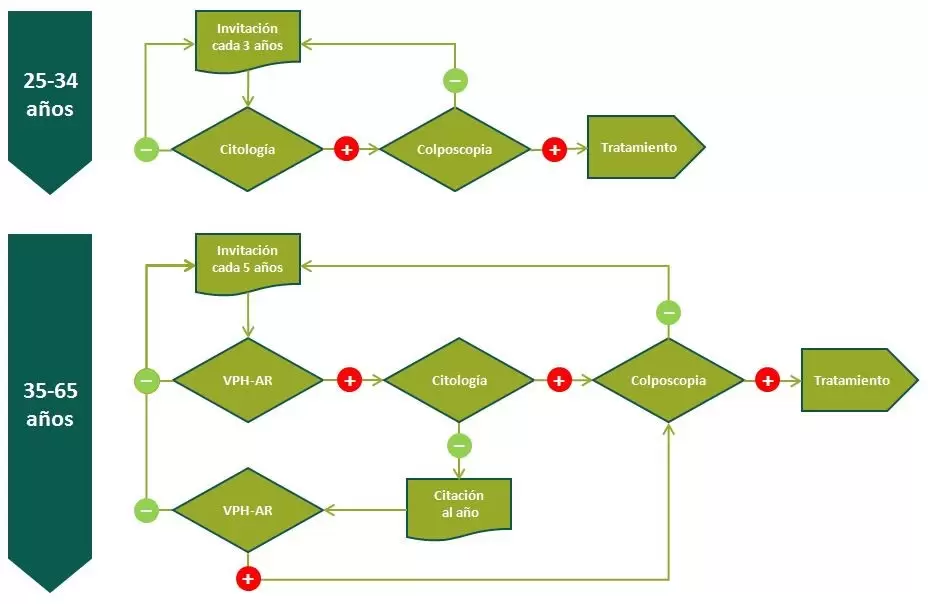Cervical cancer prevention programme
Here at DKV, we stand for promoting good health
-
Early detection tests (smear test and HPV test) help prevent the disease.
-
The prevention plan is aimed at all women between 25 and 65 years of age.
-
You will receive an invitation to participate in the programme, and you can request an appointment with your gynaecologist and tell them that you want to take the early detection test for cervical cancer.

What is the cervix?
The uterus consists of two parts: the uterine corpus, where the pregnancy develops; and the cervix, which connects to the vagina.
How does cervical cancer occur?
It occurs when cells are infected by the Human Papilloma Virus (HPV) and uncontrollably grow until forming a tumour.
HPV is easily transmitted through sexual relations and not only spreads through coital intercourse. There are no symptoms, and it disappears spontaneously most of the time.
However, in a small percentage of cases in which the infection persists over time, changes may occur in cervix cells that lead to developing premalignant lesions and could evolve into cancer.
The treatment of precursor lesions can prevent the disease. Between 10 and 15 years can elapse from the onset of the first lesion to the formation of an invasive tumour. Therefore, there is a long period to detect, treat and cure it, reducing the likelihood of developing this type of cancer.
Early detection tests (smear test and HPV test) help prevent the disease. In addition, the HPV vaccine effectively protects against the main types of HPV that cause cervical cancer.
Condom use significantly reduces the possibilities of transmitting the virus, but remember that genital contact or oral sex is sufficient for it to spread.
What does the early detection plan for cervical cancer consist in?
The objective is to reduce the mortality and morbidity rate of cervical cancer (cervix) by changing the current opportunistic screening model to a population-based organised screening model, gradually covering the entire target population.
The primary screening test and the interval between explorations depend on the age group:
-
Between 25-34 years of age: smear test every 3 years.
-
Between 35-65 years of age: High-risk HPV test every 5 years.
Provinces are incorporated annually into the early detection plan for cervical cancer by DKV until the set cover is reached. At the end of 2023, 13 provinces will have implemented the plan:
| Province | 2020 | 2021 | 2022 | 2023 | 2024 |
|---|---|---|---|---|---|
| A Coruña | X | ||||
| Álava | X | ||||
| Alicante | X | ||||
| Almería | X | ||||
| Asturias | X | X | |||
| Ávila | X | ||||
| Badajoz | X | X | |||
| Balearic Islands | X | ||||
| Barcelona | X | ||||
| Biscay | X | ||||
| Burgos | X | ||||
| Cadiz | X | ||||
| Cáceres | X | ||||
| Cantabria | X | ||||
| Castellón | X | ||||
| Ciudad Real | X | ||||
| Córdoba | X | ||||
| Cuenca | X | ||||
| Girona | X | ||||
| Granada | X | ||||
| Huesca | X | ||||
| Huelva | X | ||||
| La Rioja | X | ||||
| León | X | ||||
| Lleida | X | X | |||
| Lugo | X | ||||
| Madrid | X | ||||
| Málaga | X | X | |||
| Murcia | X | ||||
| Ourense | X | ||||
| Pontevedra | X | X | |||
| Salamanca | X | ||||
| Santa Cruz de Tenerife | X | X | |||
| Seville | X | X | |||
| Tarragona | X | ||||
| Toledo | X | ||||
| Valencia | X | X | |||
| Valladolid | X | X | |||
| Zamora | X | ||||
| Zaragoza | X | X |
Who is this plan aimed at?
All women aged between 25 and 65 who have or have had sexual relations, and they take a specific test at a particular frequency that depends on their age:
-
Between 25-34 years of age: smear test every 3 years.
-
Between 35-65 years of age: High-risk HPV test every 5 years.
How can I adhere to the plan?
If you are a DKV mutual society member, are in the age range between 25 and 65 and you live in the provinces where the campaign is going to be carried out this year, you will receive your invitation to participate by email. If we do not have your email, go to activate your card and provide us your contact details.
The process is very simple. You only have to accept the invitation and make an appointment with your Gynaecologist, indicating that you want to take the early detection test for cervical cancer that corresponds to your age. If you do not have an email address, don't worry, you will receive your invitation by post.
What does the test consist in?
The cervical smear test is a simple and easy procedure that takes less than five minutes and is usually painless. A sample of the cervix is taken using a speculum at the gynaecologist's consultation, and this is delivered to the lab to study. Once there, it is prepared for a smear test or to check for HPV.
When going for a test, we must remember not to take it during menstruation (or within the following five days) and not to use medication vaginally or engage in sexual relations within the previous two days.
What can the result be?
Most women will have a normal test result. If abnormal cells or the presence of HPV are detected, your doctor will complete the diagnostic study.
Useful links:
Do you need help?
If you are thinking about taking part of our screening plans but you have some questions, we will answer them in the way you choose.

Contact your nearest branch

Call us

Bowel cancer screening is aimed at medium-risk people, that, is men and women between 50 and 69 who have no personal or family history of the disease.
This consists in a faecal blood test every two years. If no blood is detected in this test, it's unlikely to be a case of bowel cancer. After two years, you will be invited to join the programme again.

The breast cancer screening programme consists in all female mutual society members between 50 and 69 years of age, due to a higher risk of breast cancer at this age, undergoing a mammogram every two years.
A digital mammogram is the most effective test for detecting breast cancer. It consists in a chest X-ray that, with very low radiation and adverse effect, is able to detect suspicious lesions smaller than 100 μm two years before they become palpable.


